Original author: Encrypted Weituo
Reprinted by: Daisy, Mars Finance
A month ago, the entire internet was full of FUD about the Pump ICO, but I was the only one who was bullish (original post). The comments section ended up calling me a "dumpster" and "money-grubbing" person.
Now that Pump's market share has returned to 80%, Bonk has fallen to 3%, surpassed by Bags, and the debate is meaningless.
Let’s step out of our stance and look back at some of my views at the time from the results. They may still be meaningful to future project owners and P players.
*Note: The following discussion is about the Pump and Bonk platforms themselves, not the tokens issued by the platforms. Please do not argue.
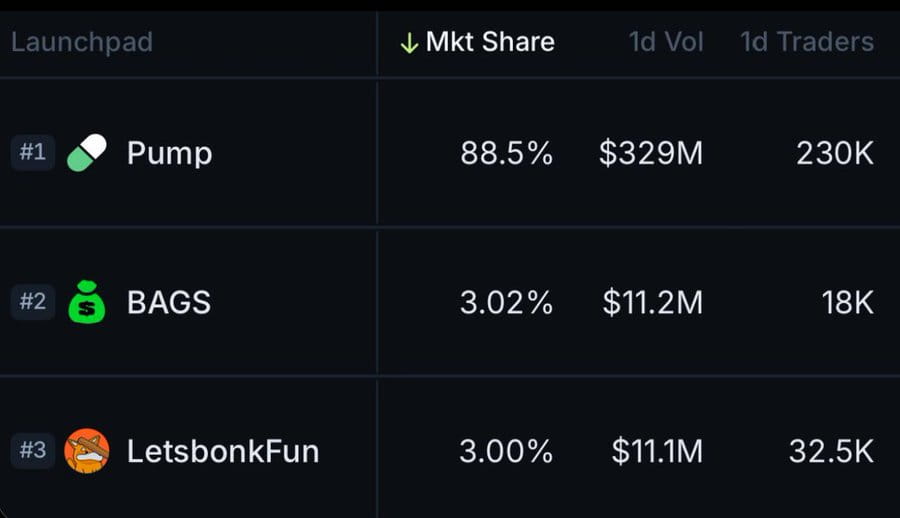 "Mass Media Says": Compared to Pump, Bonk is more like traditional radio
"Mass Media Says": Compared to Pump, Bonk is more like traditional radio
I agree with @ed_x0101 and @Michael_Liu93 that meme funds have no loyalty. But this also explains why Bonk didn't win
Those born in the 1980s and 1990s probably still remember the Chinese media before smartphones: CCTV, provincial stations, and local TV stations all broadcast the News Broadcast at 7 p.m.
At that time, media people = eating public rice, everyone relied on approval documents to make a living, the economic benefits were in the hands of the deputy director who was in charge of advertising, and they did not consider traffic but only political risks.
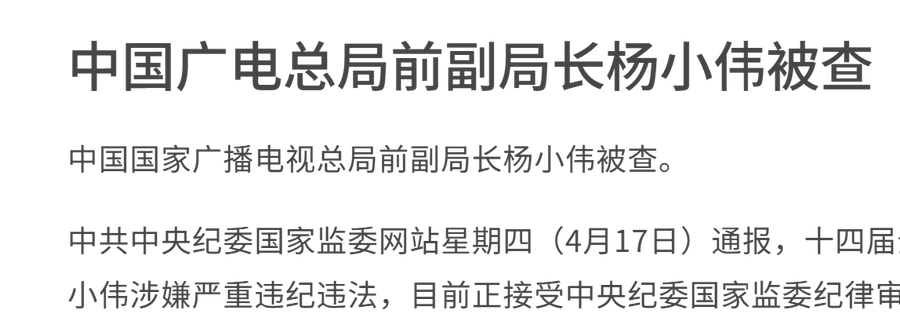 Does it look like the “Two Saints” style of play of BSC and BONK?
Does it look like the “Two Saints” style of play of BSC and BONK?
Traffic is concentrated on key official figures, and only those that are nodded by the Two Saints can take off, which makes Tom and Bangkegai bear too heavy an endorsement responsibility.
On the one hand, they need to shout orders to attract developers, but on the other hand, they are afraid of being exploited like the "BNBCARD" incident. The result is that the cost of manipulating the market is high, and new market makers are not coming. As a mutual aid platform, they cannot achieve a high turnover rate, and can only shout the same few orders every day. In the end, the price collapses and everyone is trapped.
"Giving traffic" and "calling for unilateral marginal effect" are contradictory in themselves: if you call for a collapse, you're doomed; if you don't call for a collapse, you're also doomed.
Why do I say Pump is mass media?
I have been ridiculed by many people for this statement, but please read it first:
Mass media, or self-media, allows more traffic players to monetize without the need for anyone to endorse them.
What Pump does is to turn itself into a real traffic portal
If you look at their official Twitter, it is like Facebook's 9GAG. Their job is to create/select memes from the entire network and create an interactive field in the comment area. From the 9GAG comment area grew the first generation of traffic matrix accounts, and from the Pump comment area grew angles and CA, such as $tokabu
Each tweet easily gets 200,000 to 300,000 views, which is dozens of times more than Letsbonk. At its peak, @theunipcs also had a few tweets that reached this number, but they relied on clearly encouraging the community.
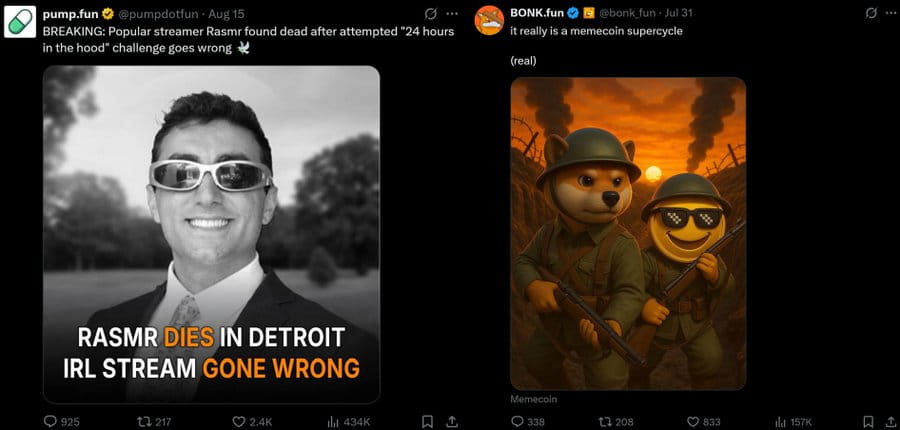
Bonk is building market value, while Pump is cultivating Dev and KOL groups.
Pump and Alon do not need endorsement, because Threadguy, Gainzy, Rasmr, Yenni, Scooter and other traffic players will be used as angles when they are involved in some drama
They can be scumbags, you can distrust them, as long as Pump as a meme portal has traffic, these traffic players are still there, the contradictions are there, and the comment area is active - Pump's traffic cost is proven to be significantly lower than Bonk's
Dissemination and endorsement are two completely different things. Dissemination requires attention, not credibility.
Just as few people want to be TV hosts these days, the centralized broadcasting and television system will inevitably be replaced by decentralized mass media.
Ponzi schemes work, but “community” doesn’t.
Bonk is a classic example of a company that thrives on its community and fails because of it.
The mechanism is almost the same as Pump, but the product is far less complete, so it can only rely on three selling points: repurchase and destruction, staking $SOL, and obtaining Solana's "official support."
The essence is to try to create a "community-first" image through these forms, to win the money of Solana's loyal community, and to explain the DeFi logic of a Bonk flywheel:
$Bonk rises → Bonk platform buys back and burns → pushes up again
Why did $Bonk fail?
First, Bonk is engaged in the market but does not understand it.
Memecoin is essentially a mutual aid platform and a split of Sol. Every meme is helping Sol defuse the bubble.
However, Bonk mistakenly viewed it as a $Bonk split. In reality, buybacks and burns are essentially a variation of dividends. Rising prices for the parent coin will only create more bubbles. Bonk's peak profit was only $2M, and even with a full buyback, it couldn't support a $2 billion market. This flywheel doesn't work.
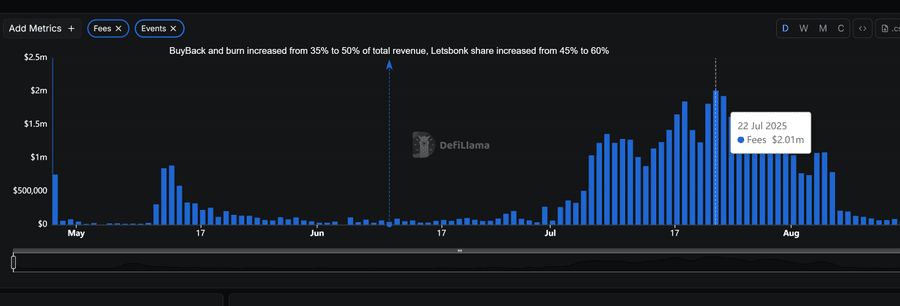
Originally, the platform was a mutual aid platform, and it only needed to constantly find ways to pull out the little golden dog to maintain its activity. However, it was tied to a big truck with the "community priority" of Bonk, turning it into a dividend-sharing platform with sunk costs. A big drop below the support level caused a direct double-kill collapse.
Second, Bonk himself was brainwashed by the "community"
Bonkguy always mentions community, but I think he doesn’t understand what “community” means to the project owner.
When I say "community" is useless, I mean people who praise you in the public domain but are actually your opponents are useless.
Memes and profit-sharing schemes are inherently zero-sum scenarios. In a zero-sum scenario, talking about "PVE" and "community" is self-deception. The "community" here is 100% an adversary.
The most puzzling move is encouraging a Chinese CTO. If building a platform to get listed on an exchange and thus harvesting the exchange's external liquidity is considered PVE, then knowing that the Sol meme is unlikely to be listed, encouraging a Chinese CTO with no market-making skills and the world's most reckless mentality is simply throwing him into a fire.
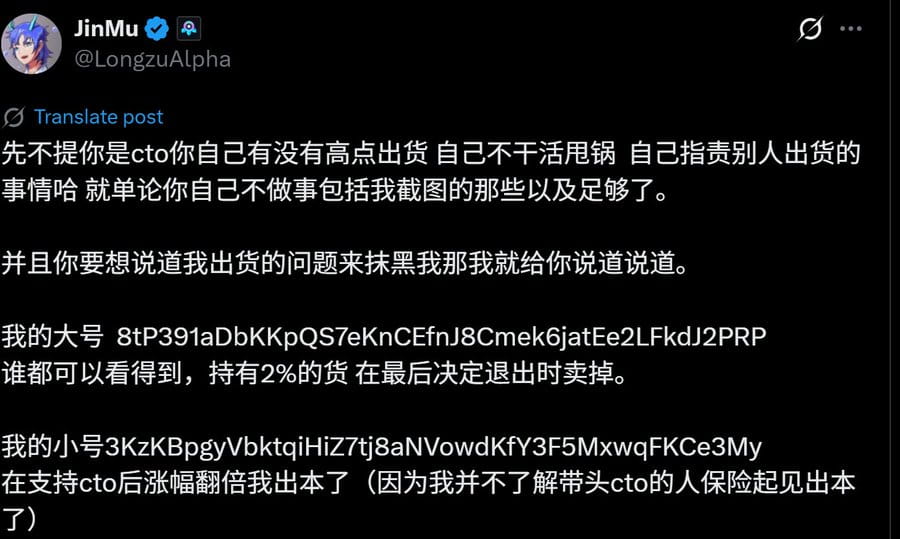
The collapse of Bonk's potential is directly related to the drama of those Chinese CTOs.
The cruel truth is: the "community" of most projects is meaningless. If Dev really believes in "community" and "long-term contributors" and falls into the trap of "dividends" and "buybacks" and other high-sounding "token uses", it will only make you bleed faster and be criticized more harshly later.
A true community is made up of people with the same interests: casino owners, gamblers, brokers, and acceptors. They are not here to form a group, but to make money. What you need to do is not to impress them, but to ensure that they continue to make money and do not become your opponents.
I firmly believe that Pump will not airdrop
There are only three types of people who are useful to Pump:
- Long-term P players who insist on betting - Traffic players who personally call orders
- The size of the continuous offer Dev
These people have the same interests, so subsidies are necessary:
- Give P players with net losses an airdrop based on their losses and historical fees, subsidize and reduce the kill rate, so that they can continue to play.
- Give traffic players an incentive to call orders, and give code rewards to the stackers
- Build a cabal market capitalization fund, buy second-stage ignition from time to time, and form a low issuance cost (market making cost, dissemination cost) that competitors cannot match
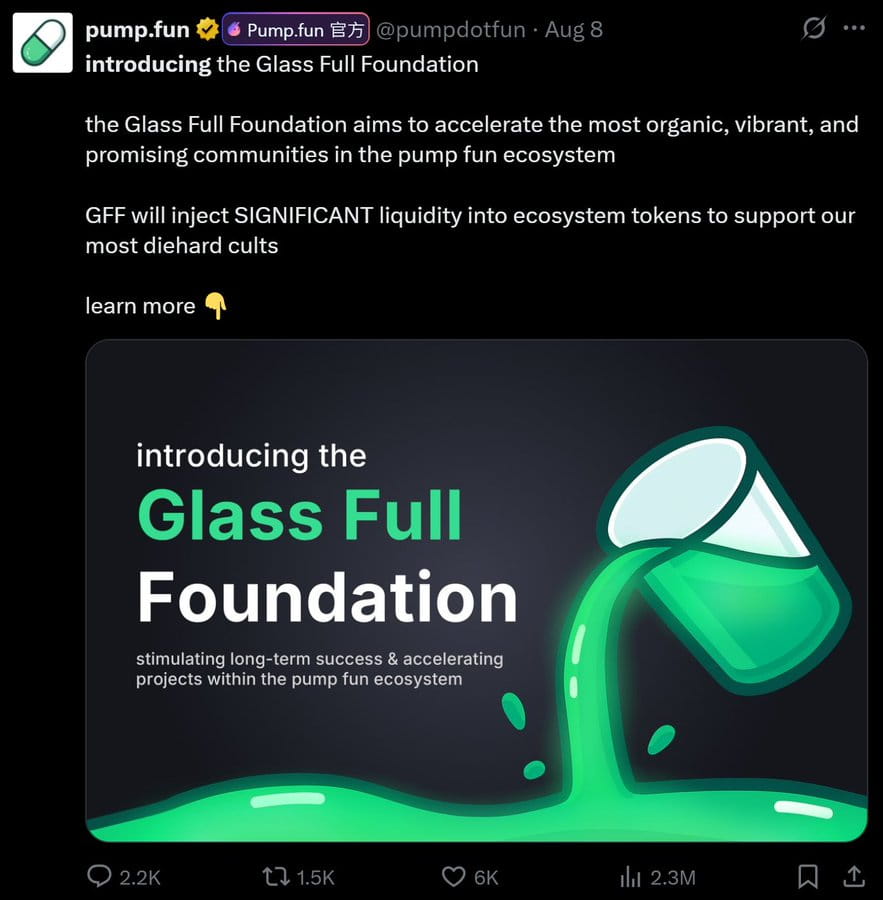
So even if Pump had tweeted, I don’t think they would or should have launched the kind of “sunshine” or “reward long-term users” airdrops, or even a 100% buyback. Any predictable buyback itself would not have any directional significance for the secondary market, at most it would be a “reason” for the upward trend.
This money can be used in other ways.
Enlightenment to P and the project team
To the project parties:
1. The key to success is the comprehensive launch cost. Players already on the platform can afford to make sporadic gold dogs, but their moat lies in how to distribute traffic based on Web2 attention. This is why today's Pump is becoming more and more like an MCN.
2. SOL’s on-chain narrative has been exhausted: Sol’s platform war has actually destroyed all on-chain issuance narratives to this day: AI, ICM... As long as it is based on the bonding curve and AMM fair launch on the chain, players can no longer feel any difference. Bonk is already the ceiling for resource-rich people.
3. If you are still working on a platform in SOL, I suggest you give up. This is the most expensive track in the entire network, no doubt about it. You can't survive on it.
4. If your product is a trading product, don’t expect a sunshine airdrop in order to make money without any effort.
To P Junior:
1. Any platform that endorses the concept of "Dragon One" and "Dragon Two" will fail.
2. However, if this platform wants to do it on Sol, it must pull out a market value of more than 5-10 million, an objective "Dragon One". However, after the failure of Bonk/Launchcoin, the ceiling of these Dragon Ones will become lower and lower. Don't fight to the death.
3. Remember "there is no PVE, only PVP". Meme is a 50x leverage contract that cannot be shorted. You can do ultra-short-term diamond hands, but you must set a stop loss and never continue to fight after the decline.
4. Don't be a CTO, don't be a CTO, don't be a CTO. Don't let the platform use you as a tool.
5. P is at the bottom of the food chain, so he must find a way to become a KOL and be at the table.

at last
I hope you won’t just see “praise one and criticize the other” in this article.
Bonk failed to challenge Pump, not because of their lack of skills or resources. They did a great job, but they positioned themselves as a launchpad for Sol. Facing Pump, in the current market, even if they performed beyond their capabilities, they could only do so much.
The competition between Pump and Bonk in Sol is asymmetric, like a top T72 tanker encountering a drone on the battlefield in Ukraine. Compared with 99% of the projects in this industry, Bonk is not a "failure"
For us, it is more important to understand why so that we can identify ourselves and better know when to retreat, stop losses in time, and replicate at the millimeter level in the future.





